Mat Fraser on playing Richard III and TV's 'pathetic' disabled casting
- Published
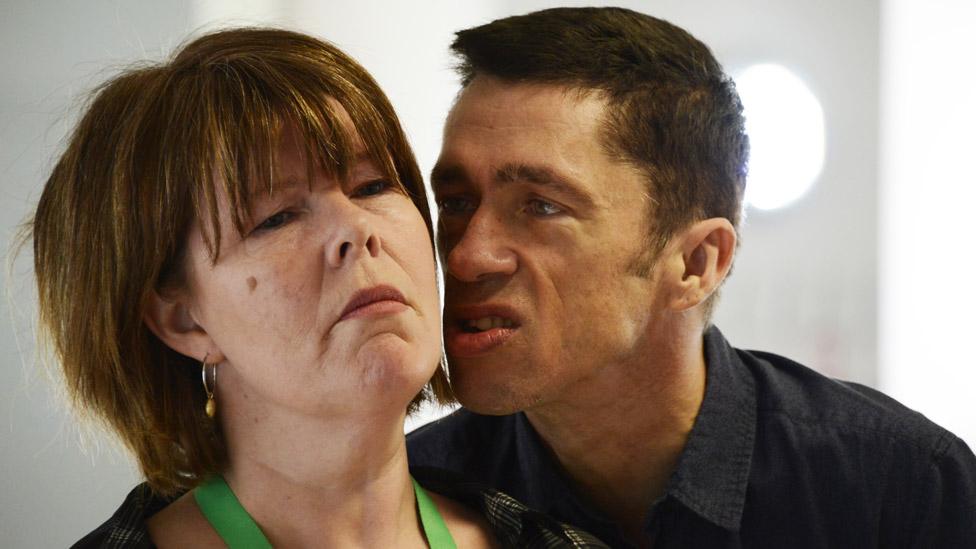
Mat Fraser plays the "wonderfully evil" Richard III, with Ruth Alexander-Rubin as Elizabeth
Mat Fraser is the first disabled actor to play Shakespeare's twisted anti-hero Richard III - and he's relishing the political incorrectness of the Bard's script. But British TV channels are "pathetic" at giving such juicy roles to disabled actors, he says.
At the end of our interview, Fraser gives me a bit of advice about how to make his quotes suitable for publication.
"Whenever I swear, just put 'hell' or 'damn' instead," he suggests.
That tip comes just after he has been talking about progress with casting disabled actors on TV.
Two minutes earlier: "In terms of opportunity for disabled people, there are four more people on telly than there were 20 years ago. Excuse me for not having a party."
Fraser and other disabled actors "clearly have the experience", he says. "I mean if I didn't have the experience, I wouldn't be asked to be doing damned Richard III, you know?
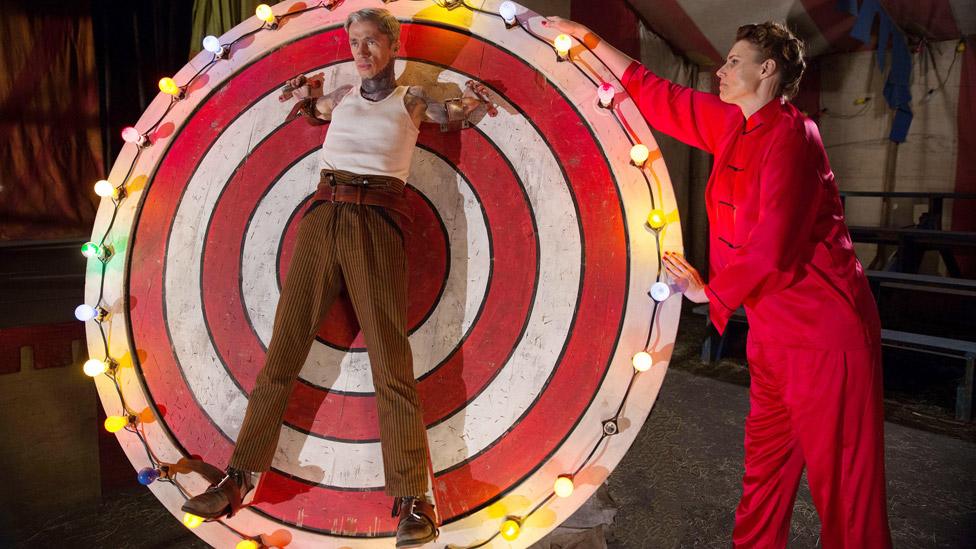
Fraser played Paul the Illustrated Seal Boy in American Horror Story: Freak Show
"If people didn't think I could act, no-one would let me near the role. But can I get a look-in in any of the BBC dramas? Can I hell."
Fraser has the experience - although recently, US TV executives have been the most willing to let him use it.
He played Paul the Illustrated Seal Boy in American Horror Story: Freak Show, and will soon be part of an addicts' self-help group in a new TV comedy by Dumb And Dumber co-creator Peter Farrelly.
He has been in bits on Channel 4 and the BBC, has been a regular on stage and played drums with Coldplay during the London 2012 Paralympic closing ceremony.
He is easily recognisable - he was born with underdeveloped arms as a result of his mum being prescribed the morning sickness drug Thalidomide during pregnancy.
Ten minutes earlier in the interview, Fraser is not yet as exasperated as he will get by being asked to talk about the opportunities on TV for disabled actors. More of that later.
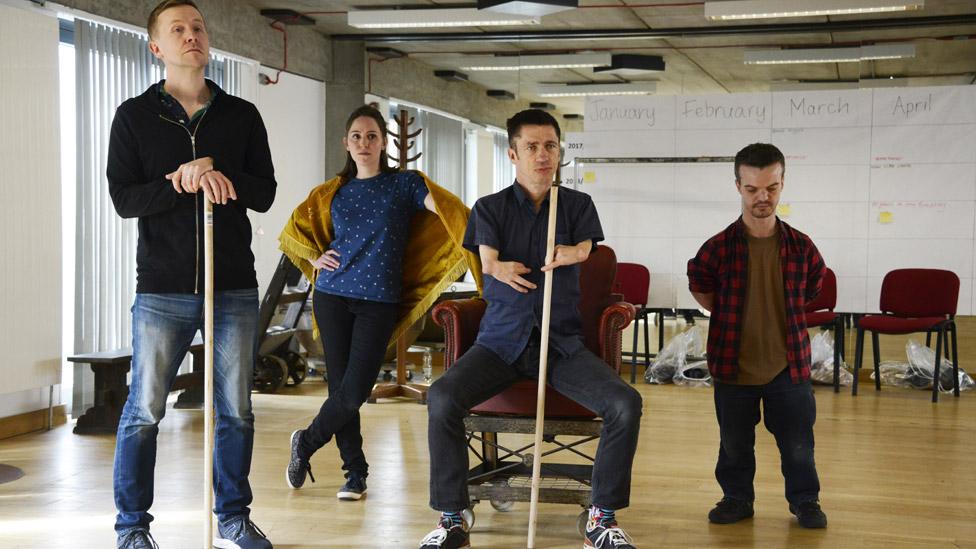
Fraser in rehearsals with Matt Connor, Catherine Kinsella and Dean Whatton
For now, he's talking about playing Richard III for the Northern Broadsides Theatre Company at Hull Truck as part of Hull's 2017 City of Culture events.
He describes Richard with relish as a "wonderfully evil character who has no redeeming qualities at all".
Unlike most actors who have played the scheming monarch, when Fraser steps on stage to deliver the famous opening speech, he won't have a pillow strapped to his back or a walking stick to demonstrate a physical ailment.
"I don't have to start performing my own impairments," Fraser says. "I can just be, in my body.
"I don't have to make any flourishy hand movements to show my wonderfully crippled hand, or prance about on a stick or anything to illustrate the point.
"I can just stand there and be, and I feel be more direct and honest."
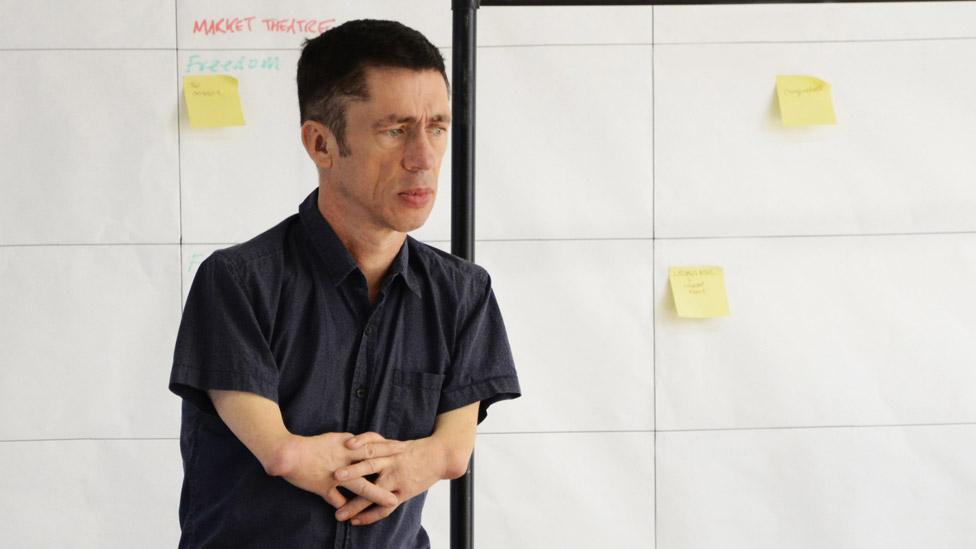
"I can be as horrible as possible and infer it's in part due to my disability and I can relax and enjoy that."
In the opening speech, Richard describes himself as "rudely stamp'd", and "cheated of feature by dissembling nature, deformed, unfinish'd". He is so bitter about his condition and how he's been treated that he is "determined to prove a villain".
Among the blunt insults that come his way, he's called a "poisonous bunchback'd toad" and a "lump of foul deformity".
Rather than having a problem with the way Richard is described, Fraser says Shakespeare's words are liberating in an age when most modern disabled characters are portrayed with the utmost sensitivity.
"It's very freeing, precisely because I don't have to worry about any political correctness or [think] 'Hmmm it's my responsibility as a disabled person to imbue this disabled character with as much sensitive understanding as possible'," he says.
"Au contraire with Richard III. It's literally my job to make him as horrible as possible."
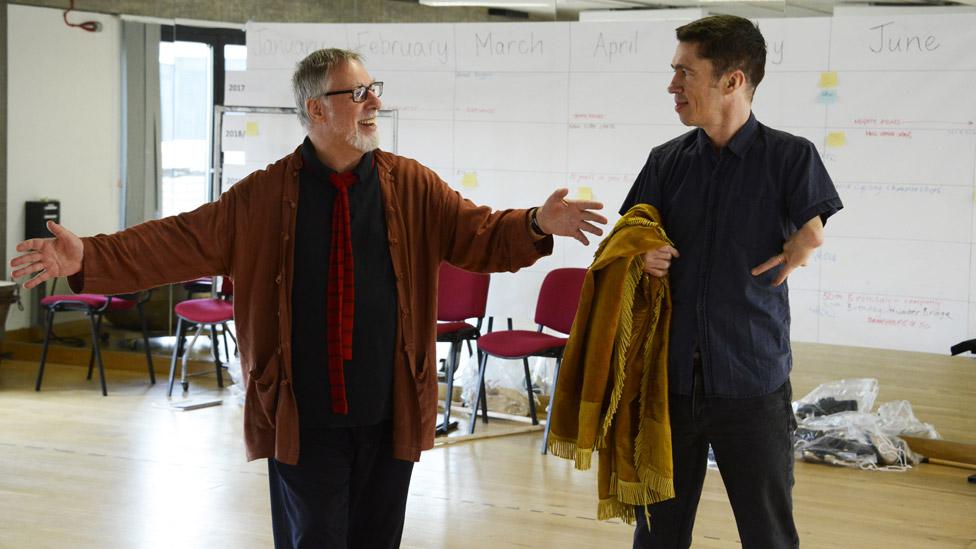
Richard III is directed by Barrie Rutter, who founded Northern Broadsides in Hull 25 years ago
Fraser says he feels he has to act as an ambassador for disabled people when playing "most characters if they're in the contemporary setting".
But with Richard, he explains: "I can be as horrible as possible and infer it's in part due to my disability and I can relax and enjoy that."
Perhaps Adam Hills, the host of Channel 4's The Last Leg, was referring to the sensitivity - maybe oversensitivity - around portraying disability when he told a recent panel discussion, external there should be more disabled villains on TV.
"Why are disabled people on TV always portrayed as being nice all the time?" he asked.
'Too politically correct'
"Nice" is not a word that could be applied to Richard III. Fraser responds to Hills' comments by saying: "Disabled people are where black people were in the '80s.
"They can't be baddies. People [in the TV industry] are too politically correct. But they're not ready to give us the hero role yet. So we get no role.
"And for anyone on Channel 4 to have a go about what characters should and shouldn't be with disabled… How about having some damned disabled actors who actually are damned characters for some of their damned dramas, yeah?
"BBC are all right. ITV are OK. I mean it's minimal and pathetic. But they have something. Something I can hold on to."
He lists Liz Carr in Silent Witness, Lisa Hammond in EastEnders and Cherylee Houston in Coronation Street.
"What have I got on Channel 4? Some damned lad who's on The Last Leg. Woo. Doesn't impress me, mate.
"And as for those panels - I've been doing panels since 1996 about trying to get disabled actors in. I'm just done with panels. Jobs not panels."
'Nothing's changed'
We're back where we started, and Fraser's exasperation is growing. He stresses he's "not having a go at Adam Hills".
"But if people want to talk to me about roles for dramas, the conversation should be, 'We'd like you to audition for…' Any other conversation is going to get short shrift from me."
How does the conversation normally go?
"It's the same as it has since 1996. 'Do you think there should be more disabled actors in different roles and what are the barriers that prevent them?'
"Yes I do. Attitudinal barriers and the fact that commissioning editors didn't go to school with disabled people.
"The questions and the answers have not changed in 21 years.
"But what has changed is my tolerance for the conversation."
Richard III is at Hull Truck until 27 May, then at the Viaduct Theatre, Halifax, from 30 May-3 June.